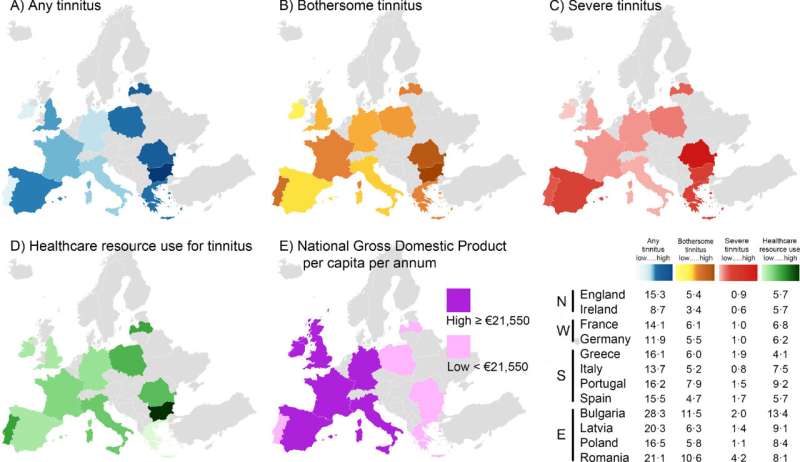Study: One in seven people in the EU suffer from tinnitus

New research led by researchers from the University of Nottingham, has found that approximately 65 million adults in the EU suffer from tinnitus, and this figure will significantly rise over the next decade.
The research, published in The Lancet Regional Health—Europe, is the first study to look rigorously at the prevalence of tinnitus across the populations of 12 EU member states.
The study was led by Roshni Biswas from the School of Medicine at the University of Nottingham, working with a team of experts from the University of Nottingham, the the Istituto di Ricerche Farmologiche Mario Negri IRCCS in Milan, Herriot-Watt University in Malaysia and the University of Regensburg in Germany.
Tinnitus is when you experience ringing or other noises in one or both of your ears that other people usually can’t hear. The condition can be moderate or severe, and in its most debilitating form, it can affect people’s emotional health and social wellbeing. At present there is no cure or approved medications to treat tinnitus, but there are therapies available to help manage the condition and the very latest drug research is showing promise.
It’s important to know the prevalence of tinnitus in different countries, but previous data has been difficult to compare across country because measurements have often been done in different ways. The aim of this study was to report a single European-wide estimate for tinnitus frequency and to investigate the effect of individual and country-level characteristics on prevalence.
Nearly 11 and a half thousand people were recruited between 2017 and 2018, to take part in a cross sectional European Tinnitus Survey in 12 EU nations (Bulgaria, England, France, Germany, Greece, Ireland, Italy, Latvia, Poland, Portugal, Romania and Spain), using a set of tinnitus-related questions and response options.
The team found that:
- The prevalence of any type of tinnitus was 14% (1.2% higher in women than in men);
- Severe tinnitus was found in 1.2% of participants ;
- Tinnitus prevalence significantly increased with age and worsening of hearing;
- Healthcare resource use for tinnitus increased with the increase of tinnitus symptom severity.
Michael Akeroyd, professor of hearing sciences in the School of Medicine at the University of Nottingham was one of the authors of the paper. He said: “This is the first time that we’ve properly and rigorously measured the scale of how much of a problem tinnitus is across Europe as a whole. Tinnitus can affect people’s mental wellbeing, and as the population grows, and people live for longer, this problem will only get worse.
Source: Read Full Article


